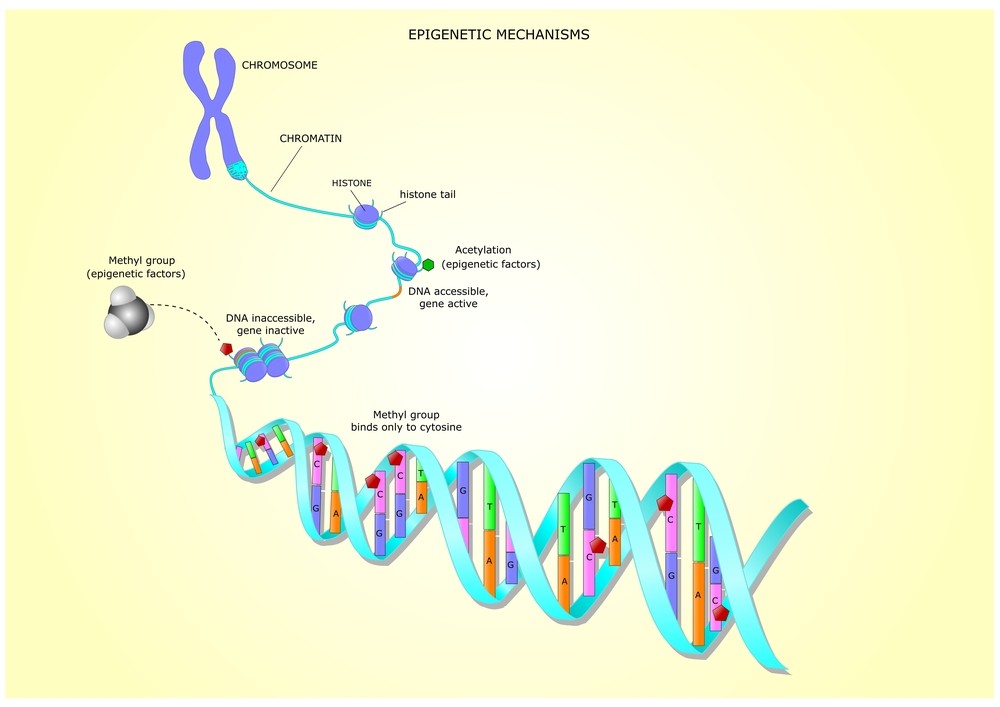“DNA methylation” is a mechanism used by cells to control gene expression – whether (and when) a gene is turned on or off. Your genes themselves never change, but how they express can be influenced by methylation.
Methylation is a simple biochemical process – it is the transfer of one carbon methyl group (CH3) from one molecule to another that either activates or deactivates that molecule. This single carbon metabolic process is critical to a multitude of processes including:
- Cell division, DNA and RNA synthesis
- Utilization of folate and vitamin B12
- Detoxification of toxins, heavy metals
- Hormone biotransformation
- Neurotransmitter biosynthesis(dopamine, serotonin and norepinephrine..)
- CNS development and neural tube formation
- Histamine clearance
- Phospholipid synthesis
- Myelination of peripheral nerves
- Immune system regulation
- Regulation of homocysteine
Methylation during pregnancy
During pregnancy, the body undergoes tremendous changes and is under significant stress and the need for methylation increases dramatically. Methylation is necessary for the proper formation and function of cells, cell membranes, and nerves. When methylation is not happening as it should during pregnancy, it can result in miscarriage, pregnancy complications, or birth defects. The pre-conception period is the critical time to address methylation issues. With many dietary, environmental and lifestyle factors including stress, lack of sleep, nutrient deficiencies and environmental toxins affecting methylation, there are many ways women can improve this vital process. Some medical conditions, such as hypothyroidism or autoimmune diseases, can also impair methylation. By optimizing methylation, you can optimize the building blocks for your developing baby.
Due to the fast rate of methylation during pregnancy, there is a requirement for a constant supply of nutrients. Nutrient deficiencies are very common in pregnancy, especially among women who have taken oral contraceptives or antacids.
Methylation is greatly dependent on the presence of certain nutrients that act as co-factors to keep the process moving smoothly. Methylation can suffer when pregnant women don’t get enough of these methylation nutrients including choline, betaine, methionine, vitamin B6, B9 (folate) and B12, as well as certain minerals like magnesium, zinc and sulphur.
SEVEN ESSENTIAL NUTRIENTS FOR METHYLATION· 5-MTHF (biologically active folate) · Methylcobalamin (active vitamin B12) · Pyridoxal 5′-Phosphate (active vitamin B6) · Riboflavin 5′-Phosphate (active vitamin B2) · Magnesium · Betaine (also known as trimethylglycine) · Vitamin D |
MTHFR Gene mutation
Many of us (more than 50% of European population) carry mutations or defects in methylation genes, and there is one in particular that has been extensively researched called “MTHFR”, or methylenetetrahydrofolate reductase. This particular gene mutation is implicated as one causative factor in a very long list of conditions, including recurrent miscarriage, spina bifida, Down’s syndrome, autism, addiction, mental illness (depression, anxiety, bipolar, schizophrenia), Alzheimer’s, fibromyalgia, chemical sensitivity, migraine with aura, atherosclerosis (cardiovascular disease), and many other conditions, especially in younger people.
This gene mutation is carried through the family tree, so if these conditions occur frequently in your family history, you may also be a carrier. On a positive note, the MTHFR defect can be corrected by supporting the process with the correct forms of nutrients to essentially ‘bypass’ the faulty enzyme.
Women with this gene defect have a reduced ability to convert folic acid into the active form and this causes synthetic vitamins to build up in the body with a toxic effect. Recent research on this gene is unfamiliar to many doctors, who fail to identify this mutation as a risk. However, this gene mutation can have a big impact on pregnancy.
Other effects of MTHFR on fertility
There have been a number of studies implicating MTHFR in unexplained female infertility. One study in particular implicates MTHFR specifically in implantation issues due to an increased tendency for blood clots to form. Women with a history of unexplained infertility displayed a higher prevalence of MTHFR C677T polymorphisms.
Another study found that high homocysteine levels (a consequence of MTHFR C677T homozygous state) is associated with oocyte immaturity and poor early embryo quality. It also states that MTHFR gene variants are associated with lower ovarian reserves, diminished response to follicular stimulation, and a reduced chance of live birth after in vitro fertilization.
Homozygous MTHFR C677T is also associated with recurrent miscarriage, due to the potential for blood clot formation(thrombophilia). Interestingly, this does not occur in all cases, so there are likely other mechanisms at play, as well as nutritional and B-vitamin status and other lifestyle factors.
Supporting methylation balance
The only way to address methylation problems is with a whole-person multi-faceted approach that takes into account stress management, exercise and most of all, diet. Diets naturally high in methylation nutrients can be used to support methylation either with or without supplementation. In addition to the vitamins and minerals present in food, certain phytonutrients have epigenetic activity that supports methylation balance. It is worth noting that pesticides put a strain on methylation pathways, another reason to support organic practices. Methylation is a key pathway by which a healthy diet can influence optimal gene expression, thereby promoting overall health and wellness of mum and her offspring.
According to Dr. Ben Lynch, a specialist in the MTHFR defect, there are many important steps to take. Below are some points extracted from his list:
| – Avoid folic acid in supplements and fortified foods. You need methylfolate instead, and regular folic acid can do more harm than good.
– Avoid folic acid blocking drugs such as oral contraceptives and methyltrexate. – Avoid antacids as they block absorption of vitamin B12 and other nutrients. – Eliminate gluten from your diet, especially wheat. – Eliminate or reduce dairy from your diet. – Increase dark leafy green vegetables as a natural source of folate. – Minimize your exposure to chemicals and toxins in your home or work environment. |





